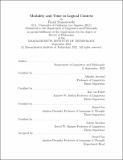Modality and Time in Logical Context
Author(s)
Staniszewski, Frank
DownloadThesis PDF (4.537Mb)
Advisor
Aravind, Athulya
von Fintel, Kai
Fox, Danny
Iatridou, Sabine
Terms of use
Metadata
Show full item recordAbstract
This thesis argues for a theory of neg-raising that is unified with existing theories of free choice (Fox, 2007; Bar-Lev, 2018) and negative polarity items (Crnič, 2014b, 2019b), as motivated by a case study of polarity-sensitive 'until'. I argue that this unification of neg-raising and polarity-sensitivity falls out as a natural consequence of the systems developed in this earlier work, combined with the novel assumption that the neg-raising predicates 'want', 'should', and 'supposed to' express underlying existential quantificational force, which is disguised on the surface as the result of obligatory strengthening in positive sentences due to the lack of a dual in the lexicon.
The primary empirical motivation for this view comes from a novel test that is able to diagnose the underlying existential meaning of the modal items. The test requires a negative presupposition trigger, like 'no longer', which creates a downward-entailing environment in which strengthening need not apply, but which also triggers an upward-entailing presupposition, in which the basic existential meaning can be revealed. I argue that further results of this test suggest a typology of neg-raising modals that is predicted by the analysis. I also present a study (joint work with Rachel Stacy and Athulya Aravind), in which we examine predictions of the analysis in the domain of language acquisition. We argue that the proposal receives support from experimental evidence suggesting that a population of children go through a stage of development in which all modals undergo strengthening in a similar manner to the neg-raising modals examined in this thesis.
Date issued
2022-09Department
Massachusetts Institute of Technology. Department of Linguistics and PhilosophyPublisher
Massachusetts Institute of Technology